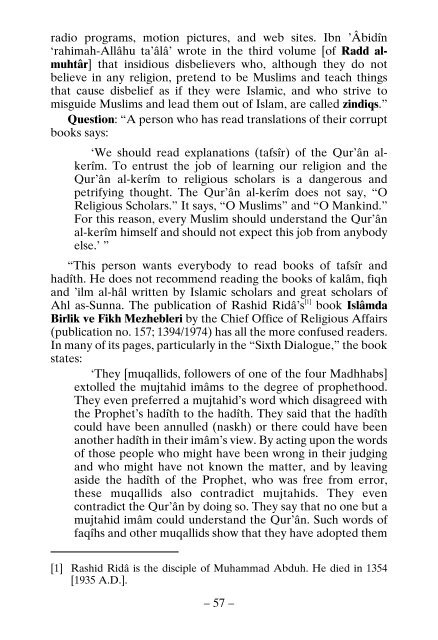Belief and Islam
BELIEF AND ISLAM star This work, Belief and Islam, originally was written in Persian under the title I’tiqâd-nâma by Hadrât Mawlânâ Khâlid al-Baghdâdî, a profound ‘âlim of Islam and a specialist in ma’ârif of tasawwuf. Hâji Faydullah Effendi of Kemah, a khalîfa of great walî Mavlânâ Mahmûd Sâhib, the brother of the author, translated the book into Turkish and named it Farâid-ul-fawâid which was printed in Istanbul in 1312 A.H.[1894]. Our bookstore had it translated again from the Persian original into Turkish and, some explanations and three chapters, published it with the title Imân ve Islâm in 1966. German, French and Arabic versions are also published by our bookstore. This book, explains five fundamentals of Islam, six fundamentals of îmân and the contemporary information about the matter and refutes those who are against Islam and those who are lâ-madbhabî.
BELIEF AND ISLAM
star This work, Belief and Islam, originally was written in Persian under the title I’tiqâd-nâma by Hadrât Mawlânâ Khâlid al-Baghdâdî, a profound ‘âlim of Islam and a specialist in ma’ârif of tasawwuf. Hâji Faydullah Effendi of Kemah, a khalîfa of great walî Mavlânâ Mahmûd Sâhib, the brother of the author, translated the book into Turkish and named it Farâid-ul-fawâid which was printed in Istanbul in 1312 A.H.[1894]. Our bookstore had it translated again from the Persian original into Turkish and, some explanations and three chapters, published it with the title Imân ve Islâm in 1966. German, French and Arabic versions are also published by our bookstore. This book, explains five fundamentals of Islam, six fundamentals of îmân and the contemporary information about the matter and refutes those who are against Islam and those who are lâ-madbhabî.
You also want an ePaper? Increase the reach of your titles
YUMPU automatically turns print PDFs into web optimized ePapers that Google loves.
adio programs, motion pictures, <strong>and</strong> web sites. Ibn ’Âbidîn<br />
‘rahimah-Allâhu ta’âlâ’ wrote in the third volume [of Radd almuhtâr]<br />
that insidious disbelievers who, although they do not<br />
believe in any religion, pretend to be Muslims <strong>and</strong> teach things<br />
that cause disbelief as if they were <strong>Islam</strong>ic, <strong>and</strong> who strive to<br />
misguide Muslims <strong>and</strong> lead them out of <strong>Islam</strong>, are called zindiqs.”<br />
Question: “A person who has read translations of their corrupt<br />
books says:<br />
‘We should read explanations (tafsîr) of the Qur’ân alkerîm.<br />
To entrust the job of learning our religion <strong>and</strong> the<br />
Qur’ân al-kerîm to religious scholars is a dangerous <strong>and</strong><br />
petrifying thought. The Qur’ân al-kerîm does not say, “O<br />
Religious Scholars.” It says, “O Muslims” <strong>and</strong> “O Mankind.”<br />
For this reason, every Muslim should underst<strong>and</strong> the Qur’ân<br />
al-kerîm himself <strong>and</strong> should not expect this job from anybody<br />
else.’ ”<br />
“This person wants everybody to read books of tafsîr <strong>and</strong><br />
hadîth. He does not recommend reading the books of kalâm, fiqh<br />
<strong>and</strong> ’ilm al-hâl written by <strong>Islam</strong>ic scholars <strong>and</strong> great scholars of<br />
Ahl as-Sunna. The publication of Rashid Ridâ’s [1]<br />
book Islâmda<br />
Birlik ve Fikh Mezhebleri by the Chief Office of Religious Affairs<br />
(publication no. 157; 1394/1974) has all the more confused readers.<br />
In many of its pages, particularly in the “Sixth Dialogue,” the book<br />
states:<br />
‘They [muqallids, followers of one of the four Madhhabs]<br />
extolled the mujtahid imâms to the degree of prophethood.<br />
They even preferred a mujtahid’s word which disagreed with<br />
the Prophet’s hadîth to the hadîth. They said that the hadîth<br />
could have been annulled (naskh) or there could have been<br />
another hadîth in their imâm’s view. By acting upon the words<br />
of those people who might have been wrong in their judging<br />
<strong>and</strong> who might have not known the matter, <strong>and</strong> by leaving<br />
aside the hadîth of the Prophet, who was free from error,<br />
these muqallids also contradict mujtahids. They even<br />
contradict the Qur’ân by doing so. They say that no one but a<br />
mujtahid imâm could underst<strong>and</strong> the Qur’ân. Such words of<br />
faqîhs <strong>and</strong> other muqallids show that they have adopted them<br />
[1] Rashid Ridâ is the disciple of Muhammad Abduh. He died in 1354<br />
[1935 A.D.].<br />
– 57 –

















